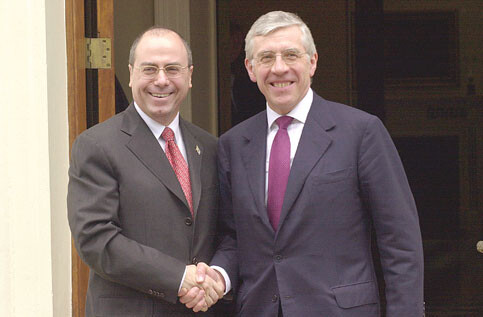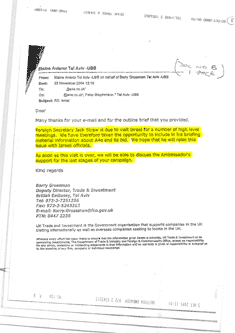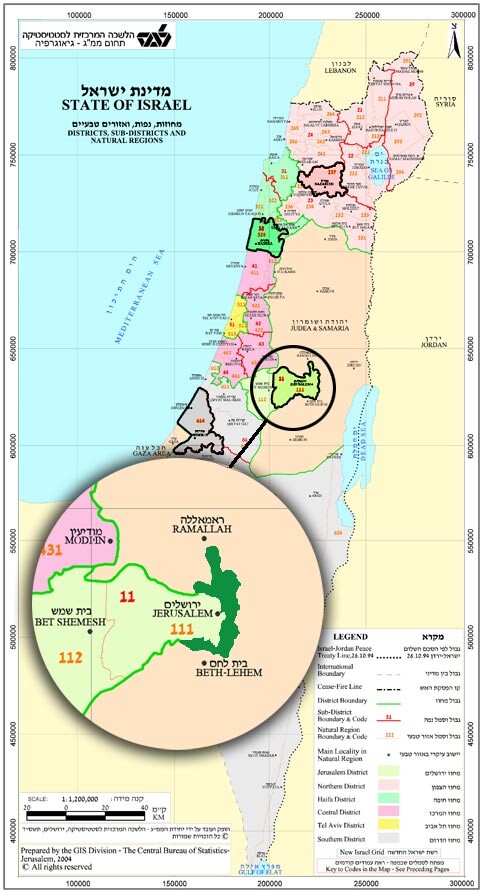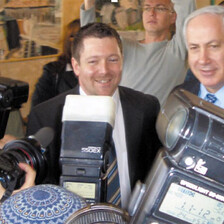The Electronic Intifada 28 November 2005
DOCUMENTS OBTAINED BY EI UNDER FREEDOM OF INFORMATION ACT: TOP UK OFFICIALS VIOLATED INTERNATIONAL LAW, HELPED BRITISH FIRM PROFIT FROM ISRAELI OCCUPATION OF JERUSALEM WHILE ASSURING PUBLIC OF OPPOSITE. PAPER TRAIL LEADS RIGHT TO FOREIGN SECRETARY JACK STRAW

UK Foreign Secretary Jack Straw (right) greets Israeli Foreign Minister Silvan Shalom in London on 15 May 2003. (Photo: Foreign and Commonwealth Office)
UK Foreign Secretary Jack Straw was asked by his officials to personally lobby the Israeli government to award a contract to a British firm which, in breach of international law and long-standing UK policy, extends Israel’s administrative and legal structures into Occupied East Jerusalem, an exclusive EI investigation can reveal.
New documents obtained by EI under the UK’s Freedom of Information Act (2000) from the Department of Trade and Industry indicate that Straw was asked to back the bid, while UK officials dismissed concerns that the company’s work could violate British policy and UN resolutions on the status of Jerusalem. In fact, UK officials have repeatedly and misleadingly reassured the public they would not support any work by firms in Occupied East Jerusalem when the record shows just the opposite.
The active role of British officials in helping the firm secure the contract was first revealed by EI last April.
Under the contract, signed with the Israeli Ministry of Finance on 1 February 2005, Sheffield-based consulting firm A4e established an employment center in Jerusalem and operates programmes as part of the “Israel Works” welfare reform scheme. Israel Works, modeled on a programme in the American state of Wisconsin, is the brainchild of former Israeli Prime Minister and Finance Minister Benjamin Netanyahu. UK support for A4e’s bid violates British policy and international law because the UK government, in compliance with UN Security Council resolutions, officially rejects Israel’s claim that East Jerusalem is part of Israel. The UK recognizes de facto Israeli sovereignty over West Jerusalem, conquered by Israel in 1948, but the UK officially considers East Jerusalem, conquered by Israel in 1967, to be occupied territory subject to protections of the Fourth Geneva Convention.
In deference to this policy, the British Embassy in Tel Aviv has no jurisdiction over Occupied East Jerusalem and is supposed to undertake no activities there. British interests in the Occupied Territories, including East Jerusalem, are represented by a separate Consulate-General in the Shaykh Jarrah district of East Jerusalem that maintains relations with the Palestinian Authority.
The new documents reveal that in violation of the UK’s own policy on Jerusalem, an official at the British Embassy in Tel Aviv emailed A4e executives that with respect to supporting the company’s efforts to secure the bid, “We are the post responsible, not the BCG [British Consulate-General] in [East] Jerusalem.” In other words, in every respect, British officials in Tel Aviv were treating Occupied East Jerusalem as if it were a part of sovereign Israel.

In apparent violation of long-standing UK policy, officials at the British Embassy in Tel Aviv asserted jurisdiction over a matter involving Occupied East Jerusalem. (Click to enlarge)

Letter from the British Ambassador in Tel Aviv to A4e executives assuring them of government support for their bid to work in Jerusalem despite concerns about the status of the city in international law. (Click to enlarge)
British officials even moved to quash concerns among A4e executives that the July 2004 International Court of Justice (ICJ) advisory opinion reaffirming the illegality of Israel’s occupation and annexation of the eastern part of the city would dampen official support for its bid. UK Ambassador to Israel, Simon McDonald, wrote a “letter of comfort” to a senior A4e executive dated 18 August 2004, assuring the executive, whose name was redacted from the letter by the British government, that, “developments such as the recent advisory opinion by the International Court of Justice on the Israel’s Security barrier [sic] and related activity in the UN […] will not affect our support for British companies who are operating in or would like to work with Israeli businesses or organisations.” The letter confirmed that the Embassy “will continue to assist and support A4e’s efforts to enter the Israeli market.”
British officials apparently attached the highest importance to securing the bid for the UK firm, even drafting in Foreign Secretary Jack Straw. On 23 November 2004, Barry Grossman, the Deputy Director of Trade & Investment at the Tel Aviv Embassy wrote to A4e executives that: “Foreign Secretary Jack Straw is due to visit Israel for a number of high level meetings. We have therefore taken the opportunity to include in his briefing material information about A4e and its bid. We hope that he will raise this issue with Israeli officials.” The documents released to EI under the Freedom of Information Act do not indicate whether Straw did actually raise the issue or whether such intervention contributed to the success of the A4e bid.
UK officials have acknowledged that support for A4e’s bid would have been improper if the proposed work covered East Jerusalem. On March 23, 2005, Peter Stephenson, the director of the UK Trade and Investment office at the Tel Aviv embassy assured EI that, “We have already advised A4e that, as British Government policy clearly states, we cannot and will not support any work emanating from this winning bid if it covers operations in East Jerusalem and the surrounding settlements that have been annexed to the city by Israel.”
The documents obtained by EI indicate that the same assurance was given to other groups expressing concern about UK government support for A4e’s bid, including the Sheffield Palestine Solidarity Campaign. The UK government released no documents backing the claims that its officials had warned A4e that they could not support work in East Jerusalem. On the contrary, Ambassador McDonald’s letter seems to show that the government went out of its way to assure A4e of its support despite the growing international concern about Israel’s efforts to illegally alter the status of Jerusalem.
British officials have remained silent about whether and when they knew that they were assisting A4e to profit from Israel’s occupation of East Jerusalem in violation of UK policy. There is no question, however, that from the very start it was obvious that the Israeli government tender on which A4e bid included work in Occupied East Jerusalem and the surrounding settlements. It is implausible that UK officials, especially those in the Tel Aviv Embassy did not know this or would not have suspected it. Their actions raise the question as to whether they knowingly violated UK government policy and international law and then misled the public about it.

UK Foreign Secretary Jack Straw was asked to personally lobby Israeli officials to support A4e’s bid to work in Occupied East Jerusalem. (Click to enlarge)

Memo prepared for Dr. Kim Howells, Minister of State at the Foreign and Commonwealth Office, to answer queries about UK support for Israeli activity in Occupied East Jerusalem. (Click to enlarge)
The Israeli government tender sought bids for companies to operate pilot projects in four official Israeli administrative regions: Nazareth, Hadera, Ashkelon and Jerusalem. As official Israeli maps clearly show, and decades-long Israeli policy has held, Israel considers the region of Jerusalem to include all of Occupied East Jerusalem and the surrounding settlements including some of the largest of all the West Bank colonies, like Gilo, Har Homa and Ramot.

An Israeli government map (background) depicts administrative districts. Shaded in dark green on the inset map is the area of Occupied East Jerusalem and surrounding settlements that Israel includes in its official designation of “Jerusalem.”
Nor was Israel trying to conceal the fact that it intended the winning bidder to work in Occupied East Jerusalem. The Israeli Finance Ministry’s public affairs office confirmed to EI on 24 March 2005 that the scheme to be operated by A4e “includes neighbourhoods in East Jerusalem.” Separately, this was confirmed by Iris Ginsburg, an official in the budget department of the Israeli Finance Ministry.
A4e has also made its intentions to work in Occupied East Jerusalem clear. The Jerusalem Post, based on an interview with A4e CEO Mark Lovell, reported that company executives “intend to open strategically-located satellite offices, allowing comfortable access to the program’s services for the city’s population groups, two of which - the haredi and Arab sectors - are the populations with the lowest rate of participation in the workforce.” (“A British vision of the Wisconsin Plan for Jerusalem,” 4 February 2005)
Ironically, the new revelations of official British collaboration with the Israeli occupation of East Jerusalem come as the Israeli government accused the UK Foreign Office of being “unrelentingly pro-Palestinian” (The Guardian, 26 November 2005). The Israeli outburst followed a report in The Guardian that a leaked secret Foreign Office document prepared for EU foreign ministers says Israeli policies are designed to prevent Jerusalem from becoming a Palestinian capital, particularly settlement expansion in and around the city (25 November 2005). The document, which states “Israeli activities in Jerusalem are in violation of both its Roadmap (peace plan) obligations and international law,” calls for tougher EU action to counter the Israeli campaign.
According to The Guardian, the secret report was written by UK diplomats at the Consulate-General in Occupied East Jerusalem. Their well-meaning efforts to rein in Israel’s aggression face an uphill struggle, not only against other EU governments like Italy’s which have sought to neutralize any pressure on Israel, but apparently also from their own colleagues at the British embassy in Tel Aviv who have aided and abetted Israel’s occupation of East Jerusalem while helping British firms to make money from it.
Ali Abunimah is a co-founder of The Electronic Intifada
Related Links:




